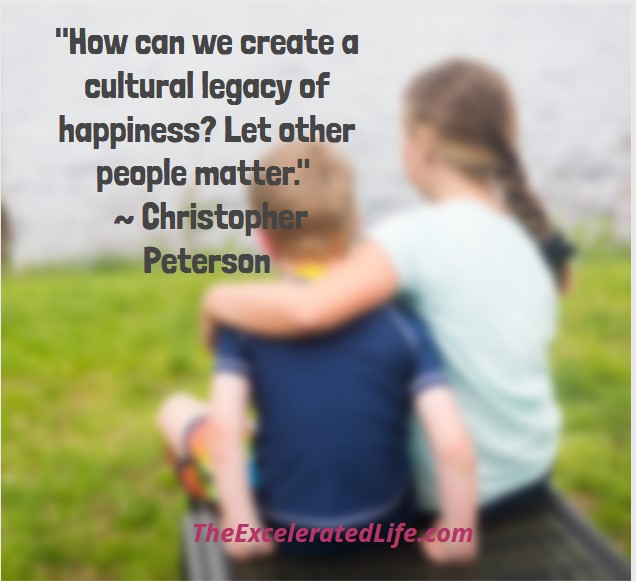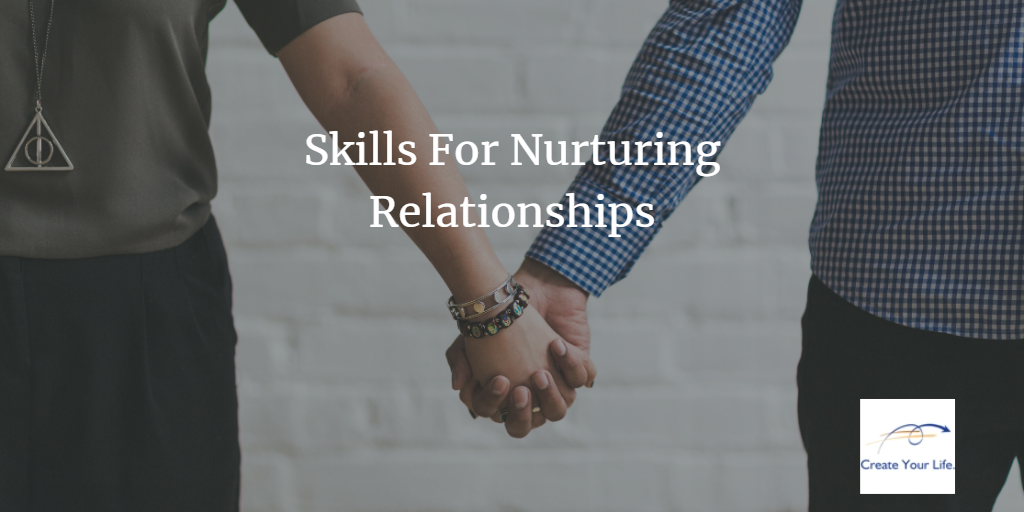Developing nurturing relationships can be learned and improved upon, like any other skill. Practice these skills for nurturing relationships to deepen your important ties to others.
TheExceleratedLife.com

Missed Flight
A husband and wife had an argument and had not spoken to each other all evening. In fact, it was not unusual for them to go several days without speaking to each other after they had a disagreement.
Tonight was different, though, because the husband had an important meeting the next day. He needed to be awake at 4:30 AM in order to catch his flight. Because he was a heavy sleeper, he usually relied on his wife to wake him up. And he needed to make this flight.
So, cleverly, he thought, when his wife was in the bathroom, he wrote a note: “Please wake me up at 4:30 AM. I have an important flight to catch.” He placed the note on his wife’s pillow, turned over, and went to sleep.
When he woke up the next morning, the sun was streaming in the window. He looked at the clock and it was 8:30 AM. Furious, he jumped out of bed. He was headed to find his wife to let her have it for allowing him to miss his flight when he spied a note on his bedside table. “Get up! It’s 4:30 AM.” [1]
Why Relationships Are Important
Developing skills for nurturing relationships are a necessary part of flourishing, so much so that Dr. Martin Seligman includes Relationships as one of the five core tenets of his PERMA theory of well-being. [Seligman]
This includes the relationship between husband and wife, and also between parent and child, between siblings, between friends, and between co-workers. All of these present opportunities to build strong, nurturing relationships.
But like most things, deep relationships don’t just happen. They require thought and action on our part. Here are some ideas for improving our skills for nurturing relationships to help us build and strengthen relationships of all kinds.
Communication
Open, honest communication is absolutely necessary for nurturing relationships. We’ve just seen in the opening story what happens when the lines of communication are damaged. Good communication doesn’t occur spontaneously. It takes effort and time to build this skill and to forge the lines of communication. [Daskal]
We’ve talked before about how giving active constructive responses to good news helps deepen a relationship. But it is also necessary to communicate openly and honestly, even on difficult issues, without attacking the other person, to build and keep a healthy relationship. When there’s a problem, don’t let it fester. Get it out in the open and talk about it. [“10 Easy Habits”]
While talking is important, open, active listening is probably even more so, because we tend not to do that so much. Look at the other person. Concentrate on what he or she is saying, not on what you’re going to reply. After your partner has stopped speaking, pause for a few seconds before you begin. Then, for clarification, repeat back in your own words what you just heard.
“Without talking, your relationship will not survive,” writes Dr. Barton Goldsmith in Psychology Today. “The more you communicate, the closer you will be.” [Goldsmith]
Trust
Trust is another keystone attribute of the relationship. Your partner, your child, your friend, your co-worker must be able to rely on you and that you’ll do what you say you will do. Honesty, reliability, dependability, and keeping your promises are all factors in building and keeping trust alive. At the same time, you must be able to depend on the other person.
Another aspect of trust, especially in romantic relationships, is giving your partner time alone without constantly wondering what he or she is doing. Everyone needs alone time and, in a healthy relationship time for oneself is freely given. If you rely on someone for every need and at every minute, they’ll end up resenting you. [“8 Rules”]
And if trust is not present in your current relationships, maybe you need to go back and practice communication.
Time
Spending time with another person is essential for developing a lasting relationship. As a well-known saying goes: Children spell “time” L – O – V – E. Truth is, we all spell “time” that way. When you love someone, you naturally want to spend time with them.
Dedicate time to the people who matter to you. [Daskal] For some close family relationships (spouse and children), this may mean touching base several times a day. You also should give these important relationships dedicated chunks of time; think date night for your spouse or one-on-one with each child, or family game night, or taking in a sporting event.
Other relationships need dedicated time as well. Some may need daily interactions, some will require less. But all relationships need dedicated time together.
Appreciation
Showing appreciation is another important skill for nurturing relationships. “If you are not careful, it can be easy to take your partner for granted.” [“10 Easy Habits”] This is especially likely for our longer-term relationships.
Small acts of appreciation pay large dividends in developing relationships. Say “thank you” for something the other person does that you usually don’t notice. Slip a note under his or her pillow. Complete a chore that they typically do. Write a letter to the other person, expressing your gratitude for their love and friendship and how much it means to you.
“Nothing kills a relationship faster than having one person feel like they are not appreciated or valued. Make it a habit to show appreciation every day.” [“10 Easy Habits”]
Kindness
“Expressing kindness is a powerful way of showing love.” [“8 Rules”]
Like appreciation, kindness sometimes gets lost in the day-to-day bustle of life or in the heat of a disagreement. That doesn’t mean it isn’t important or that you can neglect it.
One of my favorite quotes is from the late Dr. Wayne Dyer and goes like this: “When given the choice between being right and being kind, choose kind.”
When your wife puts a dent in the car, be kind. When your husband forgets your anniversary, be kind. When your friend shows up 15 minutes late for lunch, again(!), be kind. When your child leaves a mess in the middle of the living room floor, be kind.
A lot of goodwill can be destroyed in a few mean minutes – be kind.
Service
Some people look only at what they can get out of a relationship. This is not a way to build nourishing, lasting relationships. [Daskal] For a relationship to last, you must treat it as “a place where you go to give, not to take.” [Daskal]
Consider ways you can be of service to your spouse, parents, friends, children, siblings, and co-workers. By serving another person with whom you already have a relationship, you add to its stability and strength. “Giving is one of the most important acts you can do in a relationship.” [“10 Easy Habits”] Performing acts of service is an important way to show the other person that you care about the relationship.
Effective relationships require genuine reciprocity. A one-way relationship does not last. Make it your plan to give as much as you expect to get from any relationship. [Zwilling]
Forgiveness
Forgiveness is a skill that every relationship needs from time to time. The longer you’ve been in the relationship, the more likely you’ll need to forgive and to ask for forgiveness.
Sometimes, communication breaks down and misunderstandings ensue. Practice forgiveness.
Someone you love breaks a promise, or you break your promise to someone you love. A lack of trust creeps in. Practice forgiveness.
You or your loved one get caught up in the bustle of life and neglect each other. Practice forgiveness.
Instead of being appreciative of the other person, you begin to take each other for granted. Practice forgiveness.
Whether intentionally or unintentionally, one of you is unkind to the other. Practice forgiveness.
Compassion, acceptance, and forgiveness will help you through a difficult time. “If you are together for a while, there will be losses, challenges, and some things that you just can’t fix.” [Goldsmith] Holding grudges, confessing the other person’s sins, can tear a relationship apart. Practice forgiveness.
Respect
Although I’ve put this skill last on the list, it is the foundation on which strong relationships are built. Communication, trust, appreciation, kindness, and all the other skills will be difficult to use effectively without respect.
A healthy relationship is created on a “strong sense of mutual respect”. [“8 Rules”] The inevitable disagreements, misunderstandings, and missteps can all be handled properly, without damaging the relationship, if they are faced with mutual respect for one another.
Improve Your Relationship Skills
Relationships are important. “The desire for connection is a fundamental human need,” writes Bridget Grenville-Cleave in Positive Psychology – A Practical Guide. “Your relationships (with family, friends, loved ones, colleagues and others) are a central source of well-being.” [Grenville-Cleave]
Fortunately, the skills for developing nurturing relationships can be learned and improved upon, like any other skill. While the list given here is not definitive, it does contain important ways to develop and build lasting relationships. Practice these skills for nurturing relationships to deepen your important ties to others. That is embracing the Excelerated Life™!
Developing Excelerated Relationships™ — nurturing ties to other people — is one step in creating your Excelerated Life™, a life of flourishing and well-being, and a life of meaning, purpose, and service.
Read more about the Excelerated Life™.
Footnotes:
[1] I adapted this from a story on the BusinessBalls website. See Resources.
Resources:
“8 Rules To Make Your Relationship Even Stronger.” Wake Counseling & Mediation. Wake Counseling & Mediation, October 24, 2020. Web. January 17, 2021.
https://www.wakecounseling.com/therapy-blog/2020/10/24/8-rules-to-make-your-relationship-even-stronger
“10 Easy Habits That Will Nurture Your Relationship.” Wake Counseling & Mediation. Wake Counseling & Mediation, March 3, 2019. Web. January 17, 2021.
https://www.wakecounseling.com/therapy-blog/10-easy-habits-that-will-nurture-your-relationship
Daskal, Lolly. “8 Simple Ways to Nurture Your Most Important Relationships.” Inc. Mansueto Ventures, October 26, 2015. Web. January 17, 2021.
https://www.inc.com/lolly-daskal/8-simple-ways-to-boost-your-most-important-relationships.html
Goldsmith Ph.D., Barton. “10 Ways to Nurture Your Relationship.” Psychology Today. Sussex Publishers, LLC, May 4, 2010. Web. January 17, 2021.
https://www.psychologytoday.com/us/blog/emotional-fitness/201205/10-ways-nurture-your-relationship
Grenville-Cleave, Bridget. Positive Psychology: A Practical Guide. New York: MJF Books. 2012.
Seligman, Ph.D., Martin E. P. Flourish. New York: Free Press, 2011.
“The Bedtime Story.” Businessballs. Businessballs,. Web. January 17, 2021.
https://www.businessballs.com/amusement-stress-relief/stories-analogies-and-fables/
Zwilling, Martin. “6 Strategies for Building the Relationships You Need to Succeed in Business.” Inc. Mansueto Ventures, May 10, 2018. Web. January 17, 2021.
https://www.inc.com/martin-zwilling/6-strategies-for-building-relationships-you-need-to-succeed-in-business.html


